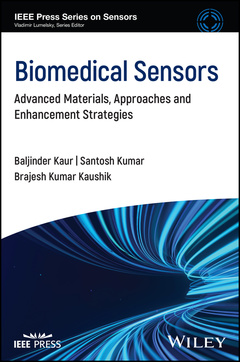Biomedical Sensors Advanced Materials, Approaches and Enhancement Strategies IEEE Press Series on Sensors Series
Auteurs : Kaur Baljinder, Kumar Santosh, Kaushik Brajesh Kumar

Comprehensive resource covering new technologies, materials, strategies, and recent advancements in the field of biosensing
Biomedical Sensors summarizes cutting-edge technologies in biosensing, including gene editing (known as Clustered Regularly Interspaced Short Palindromic Repeat or CRISPR), quorum sensing utilizing inter and intra cell signals, two-dimensional (2D) materials and aptamer-mediated sensor designs, and more, with additional coverage of the latest materials, strategies, and advancements made in the field.
Chapters are categorized on the basis of various bio-recognition elements that include aptamer, nucleic acid, enzymes, antibodies, bacteriophages, peptides, and molecular imprinted polymers. Plasmonic, surface-enhanced Raman scattering, colorimetric, fluorescence, electrochemical, magneto and piezo-electric biosensor sensing techniques are also considered. The roles of various nanomaterials, advancement in synthesis, signal enhancement strategies, and new trends for biomedical applications are also described. Current challenges, limitations, and future prospects to developing biosensors for point-of-care and clinical applications are also discussed.
Written by three highly qualified authors, Biomedical Sensors includes information on:
- Diverse bio-receptors include nucleic acids, aptamers, enzymes, antibodies, bacteriophages, molecularly imprinted polymers, whole-cell, and techniques of immobilization
- Different transduction principles using bio-receptors (e.g., optical, electrochemical, piezo-electrical, and SERS) to detect microorganism, toxins, and diseases
- Nanomaterials synthesis, their role in biosensing, pros and cons of carbon, polymer, metals, metal oxides, and quantum dots-based nanomaterials in medical biosensing applications
Biomedical Sensors is a comprehensive and complete resource on the subject for researchers and professionals in physics, chemistry, and biomedical science, research communities working in the fields of plasmonics, optics, biosensors, and nano-photonics, and students in related programs of study.
Baljinder Kaur, PhD, is a Post-Doctoral Fellow at the Indian Institute of Technology, Roorkee, India. She has published more than 20 research articles in national and international SCI journals.
Santosh Kumar, PhD, is a Full Professor in the Department of Electronics and Communication Engineering at the K L Deemed to be University, Guntur, India.
Brajesh Kumar Kaushik, PhD, is a full Professor in the Department of Electronics and Communication Engineering at the Indian Institute of Technology, Roorkee, India.
Date de parution : 12-2024



